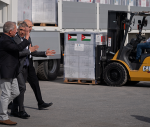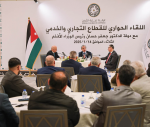You are here
Jordan, Syria anti-terrorism coordination the key to full political ties
Dec 08,2019 - Last updated at Dec 08,2019
The progressive change in priorities in the Middle East over the last decade is quite poignant. Imposed democracy to revolutions for democracy and liberty have, in recent years, evolved into the singular focus of combatting terrorism. Similarly, the ideological imposition of democracy and freedom has developed into economic pragmatism. The new waves of protests in Lebanon and Iraq might pave the way to a period of instability and logically new security challenges.
It is clear that Daesh has created the political impetus to unite regional and international powers. But unless a new way to respond to and face these threats is found, the region is bound to the same cycle it has run over the last decade. In Iraq and Syria, many signs highlight the risk of the return of terrorist groups, potentially even a rebranded Daesh.
Jordan faces challenges at the international, regional and domestic levels. There is a significant shift under way in the conduct of international politics, where international relations are increasingly based entirely on economic interest. Jordan needs to revise its position and approach based on these changes, as the underlying value of its perceived political alliances has shifted. Anti-terrorism coordination, for example, could be used to build trust between Jordan and its neighbours’ intelligence organisations, and the people of both countries can come together by looking to the past where they have been allies to build a strong future together.
Jordan’s geographic position has been used to its advantage in political positioning for many years and now the focus must be shifted to use that location for economic advantage by engaging with its neighbours and using shared borders for shared economic interest. This requires a serious revision of Jordanian foreign policy, as it faces growing obstacles in the region. Restoring relations with Syria should be at the top of the agenda for Jordan, as rebuilding Syria represents a golden opportunity for growth for the Jordanian economy. Jordan needs a new narrative to reposition the relationship, as Jordan’s national interests are more important than personal enmities and histories.
This opportunity is present, but if Jordan does not change its approach soon it will pass and others will work with Syria and reap the rewards. In addition, Jordan will continue to face increasing economic hardship that will become progressively more difficult to address. Therefore, Jordan should immediately start its trust-rebuilding process, but it must remember that in any trust-building process, the role of mediators, second track engagement and the political perspectives of decision makers are very important. While the ideal future may be a long way down the road, geography mandates that Jordan and Syria must engage more deeply and rebuild their relationship in order to achieve fruitful and successful futures for both countries.
There is already growing instability on Jordan’s borders and in its major cities that is a result of the economic hardship and the apparent lack of policies or strategies from the government. People need hope that there are better days ahead, and they want the opportunity to take control of their lives and their situation in order to improve their lives. Stable, modern society is predicated on this very idea, and without a new approach, Jordan will continue to destabilise and struggle.













